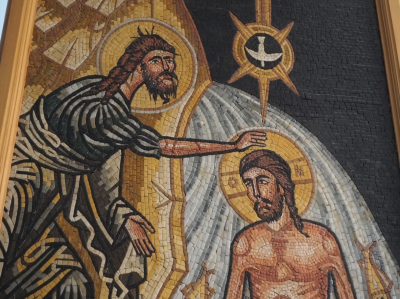The most irritating story in the Bible

Every time I read it, I have a what-the-heck moment and shake my head.
Skeptics oftentimes say the Bible is nothing more than a collection of fairy tales, but if you want to cherry-pick one account from Scripture that demonstrates what a lie that is, it’s the death of John the Baptist.
What we have is the antithesis of a feel-good story where justice prevails and/or the hero makes an in-your-face comeback like in the account of Christ and His crucifixion and resurrection or Joseph who could declare at the end of his trial, “You meant evil against me, but God meant it for good” (Gen. 50:20).
With John, you have a case where the ones wearing the black hats really seem to win.
And for a guy that the Son of God describes as “among those born of women there has not arisen anyone greater than John the Baptist!” (Matt. 11:11), it just seems off. No matter how you turn the narrative inside and out you’re still left with a head scratcher.
The Bible describes what happened to John in Matthew 14:1–12 and Mark 6:14-30. We’re told John got into trouble with Herod who “bound him and put him in prison because of Herodias, the wife of his brother Philip. For John had been saying to him, ‘It is not lawful for you to have her’” (Matt. 14:3-4).
John experienced firsthand from Herod and Herodias the old Latin phrase, Veritas odium parit — truth produces hatred.
I’m sure you know the rest of the story. You’ve got a witch’s brew of an evil king, a conniving and grudgeful queen, a pawn used to put into motion John’s death with the queen’s daughter, all of which result in the wicked request of “Give me here on a platter the head of John the Baptist” (Matt. 14:8).
All that evil comes against John, and it seems to be successful — he’s murdered and the story just ends. No comeuppance for those involved in his death follows.
Like me, I think the British minister Matthew Henry was irked at the account’s conclusion, writing in his commentary: “Thus was that voice silenced, that burning and shining light extinguished; thus did that prophet, that Elias, of the new Testament, fall a sacrifice to the resentments of an imperious, whorish woman.”
“Whorish woman”? It's hard to get a Puritan riled up, but it looks like John’s account even got to Mr. Henry.
“Ah,” you think, “maybe we don’t see a bad end to these scoundrels in Scripture but I bet they got what was coming to them in this life somehow.” Well, you be the judge of that.
The historian Josephus (who also touches on John's death in his writings) tells us that when Caligula, Emperor of Rome, made Agrippa king, Herodias pressed Herod to go to Rome and buy the title and privilege of being king, but Caligula instead banished them to exile in Gaul where they lived until their death. As for Herodias’ daughter, there is a non-verified account of her falling through some ice as she walked over a body of water and her head being severed in the incident, which seems a bit too good to be true.
At least in this life, alas, all evil parties seem to have gotten away with their crime.
No good deed
As emotionally irritating as John’s account is, he’s certainly not the only prophet of God to die that way. Jesus made mention of this fact when He said, “Jerusalem, Jerusalem [a reference to its leaders], who kills the prophets and stones those who are sent to her!” (Matt. 23:37). Stephen asked his murderers, “Which one of the prophets did your fathers not persecute?” (Acts 7:52).
The aggression shown God’s prophets makes us angry but we know “the mind set on the flesh is hostile toward God; for it does not subject itself to the law of God, for it is not even able to do so” (Rom. 8:7). And although John the Baptist's death was a horrible injustice, it was nothing less than what others experienced like Isaiah who tradition says was sawn in two.
On this point, Matthew Henry says: “These extraordinary sufferings of him [John] who was the first preacher of the gospel, plainly show that bonds and afflictions will abide the professors of it. As the first Old-Testament saint, so the first New-Testament minister, died a martyr. And if Christ’s forerunner was thus treated, let not his followers expect to be caressed by the world.”
Moreover, we should remember that the timing of such things only happens when God allows it. John had fulfilled the purpose to which the Lord called him, which was to be “the voice of one crying in the wilderness: ‘Prepare the way of the Lord; make his paths straight’” (Matt. 3:3).
All that said, John’s story still gets under my skin. And I believe that’s the way it should be.
Dr. Edward John Carnell calls the anger we feel over such things our “judicial sentiment,” which is part of God’s image that’s sewn into us. He writes, “Whereas conscience accuses the self, the judicial sentiment accuses others … All aroused judicial sentiment is merely Heaven’s warning that the image of God is being outraged.”
Scripture tells us that such outrage will ultimately be satisfied at some point, if not in this life, then in the next. For evil like John experienced, that wait is frustrating. Still, the Bible speaks to such justice being a future reality for God’s martyrs:
“When the Lamb broke the fifth seal, I saw underneath the altar the souls of those who had been slain because of the Word of God, and because of the testimony which they had maintained; and they cried out with a loud voice, saying, “How long, O Lord, holy and true, will You refrain from judging and avenging our blood on those who dwell on the earth?” And there was given to each of them a white robe; and they were told that they should rest for a little while longer, until the number of their fellow servants and their brethren who were to be killed even as they had been, would be completed also” (Rev. 6:9–11).
This means Herod, Herodias, and her daughter have a judgment coming, even if we won’t see it here. It’s much like A. W. Tozer said, “The wheels of God's judgment may grind slow but they grind exceedingly fine.”
Robin Schumacher is an accomplished software executive and Christian apologist who has written many articles, authored and contributed to several Christian books, appeared on nationally syndicated radio programs, and presented at apologetic events. He holds a BS in Business, Master's in Christian apologetics and a Ph.D. in New Testament. His latest book is, A Confident Faith: Winning people to Christ with the apologetics of the Apostle Paul.




























